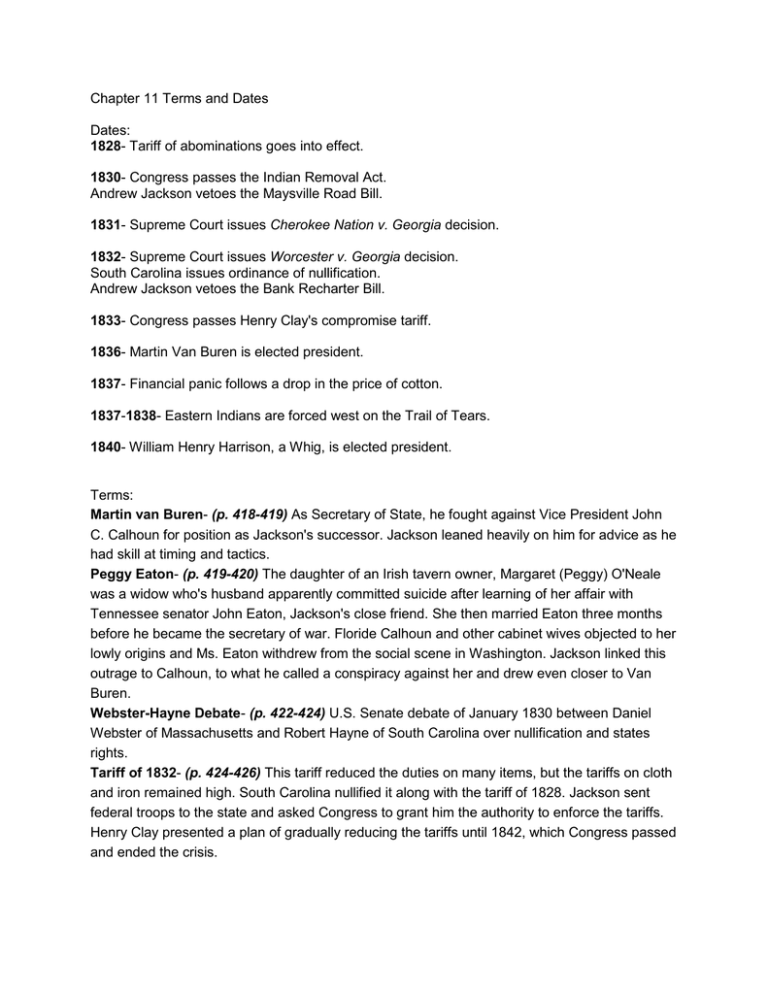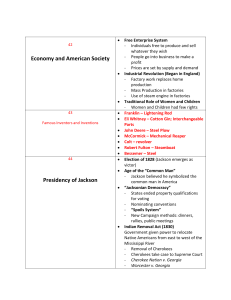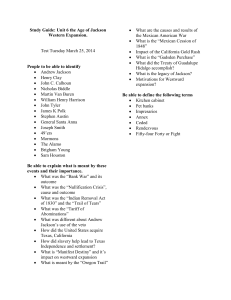Chapter 11_EHolt
advertisement

Chapter 11 Terms and Dates Dates: 1828- Tariff of abominations goes into effect. 1830- Congress passes the Indian Removal Act. Andrew Jackson vetoes the Maysville Road Bill. 1831- Supreme Court issues Cherokee Nation v. Georgia decision. 1832- Supreme Court issues Worcester v. Georgia decision. South Carolina issues ordinance of nullification. Andrew Jackson vetoes the Bank Recharter Bill. 1833- Congress passes Henry Clay's compromise tariff. 1836- Martin Van Buren is elected president. 1837- Financial panic follows a drop in the price of cotton. 1837-1838- Eastern Indians are forced west on the Trail of Tears. 1840- William Henry Harrison, a Whig, is elected president. Terms: Martin van Buren- (p. 418-419) As Secretary of State, he fought against Vice President John C. Calhoun for position as Jackson's successor. Jackson leaned heavily on him for advice as he had skill at timing and tactics. Peggy Eaton- (p. 419-420) The daughter of an Irish tavern owner, Margaret (Peggy) O'Neale was a widow who's husband apparently committed suicide after learning of her affair with Tennessee senator John Eaton, Jackson's close friend. She then married Eaton three months before he became the secretary of war. Floride Calhoun and other cabinet wives objected to her lowly origins and Ms. Eaton withdrew from the social scene in Washington. Jackson linked this outrage to Calhoun, to what he called a conspiracy against her and drew even closer to Van Buren. Webster-Hayne Debate- (p. 422-424) U.S. Senate debate of January 1830 between Daniel Webster of Massachusetts and Robert Hayne of South Carolina over nullification and states rights. Tariff of 1832- (p. 424-426) This tariff reduced the duties on many items, but the tariffs on cloth and iron remained high. South Carolina nullified it along with the tariff of 1828. Jackson sent federal troops to the state and asked Congress to grant him the authority to enforce the tariffs. Henry Clay presented a plan of gradually reducing the tariffs until 1842, which Congress passed and ended the crisis. Force bill- (p.427-428) During the nullification crisis between Jackson and South Carolina, Jackson asked Congress to pass this bill in 1833, which authorized him to use the army to force South Carolina to comply with federal law. Osceola- (p. 428-429) He was the leader of the Seminole nation of Florida who resisted the federal Indian removal policy through a protracted guerrilla war from 1835 to 1842. In 1837, Osceola was seized by treachery under a flag of truce and imprisoned at Fort Moultrie, where he was left to die. Trail of Tears- (p. 429-432) The Cherokees had fallen back into northern Georgia and western North Carolina, living on the land given to them in 1791 by a treaty with the U.S. government. Although, in 1802 Georgia ceded its western land to the federal government on the condition that the U.S. extinguish all Indian titles within the state. In 1827 the Cherokees made their own constitution declaring that they are not subjects to any laws or control of other states or nations. After Jackson's election, on June 1, 1830, Georgia declared that the state law would include the Cherokees living in the state. In the Supreme Court case, Cherokee Nation v. Georgia, Chief Justice John Marshall said that the Court lacked jurisdiction since the Cherokees were their own "domestic dependent nation". Andrew Jackson did nothing to enforce the Court's decision, claiming that any treaties with the Native Americans were "an absurdity." The Cherokees then had no choice but to sign a treaty in 1835, giving up their land in the Southeast in exchange for tracts in the Indian Territory west of Arkansas, $5 million from the federal gov, and expenses for transportation. From 1838 to 1839, 15,000 Cherokees were forced to march on the Trail of Tears to Oklahoma on an 800 mile journey where 4,000 died along the way. Nicholas Biddle- (p. 432-433) (1786-1844) He was the president of the second Bank of the United States. In response to Jackson's attacks on the bank, Biddle curtailed the Bank's loans and exchanged its paper currency for gold and silver. He was hoping to provoke an economic crisis to prove the bank's importance. In response, state banks began printing paper without restraint and lent it to speculators, causing binge in speculating and an enormous increase in debt. Anti-Masonic Party- (p. 435-436) This party grew out of popular hostility toward the Masonic fraternal order and entered the presidential election of 1832 as a third party. It was the first party to run as a third party in a presidential election as well as the first to hold a nomination convention and announce a party platform. Pet banks- During Jackson's fight with the national bank, he resolved to remove all federal deposits from it. To comply with Jackson's demands, Secretary of Treasury Taney continued to draw on the government's accounts in the national bank, but deposit all new federal receipts in state banks. The state banks that received these deposits were called "pet banks." Whig party- (p. 439-440) founded in 1834 to unite factions opposed to President Andrew Jackson, the party favored federal responsibility for internal improvements; the party ceased to exist by the late 1850's, when party members divided over the slavery issue. Spoils System- The term- meaning the filling of federal government jobs with persons loyal to the party of the president- originated in Andrew Jackson's first term; the system was replaced in the Progressive Era by civil service.






